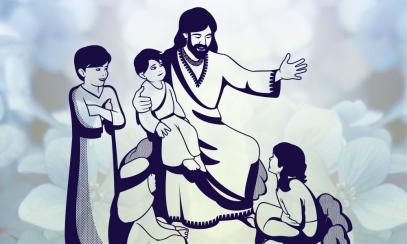
Via Fidelis: Pilgrims of hope along the Via Fidelis
Over the past couple of months, we have begun turning our attention to Via Fidelis (the way of the faithful/faithful way), our roadmap for the next several years in the Diocese of Charleston. We discussed the contours of the journey that consists of five steps over five years — Proclaim the Faith (2025), Understand the Faith (2026), Celebrate the Faith (2027), Serve the Faith (2028) and Share the Faith (2029).
Over the past couple of months, we have begun turning our attention to Via Fidelis (the way of the faithful/faithful way), our roadmap for the next several years in the Diocese of Charleston. We discussed the contours of the journey that consists of five steps over five years — Proclaim the Faith (2025), Understand the Faith (2026), Celebrate the Faith (2027), Serve the Faith (2028) and Share the Faith (2029).
Those who work in the catechumenate, the process through which someone joins the Catholic Church, will notice that these five steps loosely resemble that path. It is a gradual process that involves a constant deepening of one’s relationship with Christ and his Church. This is fitting since as the Church in South Carolina, we are together embarking on a journey of deepening and sharing our faith. We also discussed the first year’s Proclaim the Faith theme and its confluence with the missionary stage of the National Eucharistic Revival and the corresponding Walk with One initiative encouraged by the U.S. Conference of Catholic Bishops.
I want to continue this same message of consonance with other current events and movements in the wider Church, this time looking at something happening globally in 2025. Our year of Proclaiming the Faith is also a significant year in the Universal Church. It is a jubilee year. The notion of a jubilee year goes back to Leviticus 25, which prescribed a special year every 50 years (the year after seven groups of seven years). It is envisioned as a time of restoration. The land was given rest, debts were remitted and slaves were set free. Land that was sold was to be returned to its original owners, the families to whom it was given as Israel entered the promised land.
All of this restoration was to be a reminder of the endurance of God’s covenant with his people. Freedom from slavery, descendants and the land itself were all given to God’s people through this covenant relationship. It is no wonder then that the word jubilee in English has a connotation of celebratory joy. The word itself is ultimately derived from the ram’s horn (יוֹבֵל, yobel) that was used to announce this special year (see Lev 25:10).
Like its ancient counterpart and template, the jubilee is intended as a time to celebrate restoration and mercy. This emphasis on repentance and mercy reorients us to Christ and draws us back into the New Covenant. Our Christian celebration of jubilee years began with Pope Boniface VIII in 1300, who encouraged the faithful all over the world to make a pilgrimage to Rome to visit and pray at the tombs of Sts. Peter and Paul and to experience God’s forgiveness. He envisioned this as something that would occur every 100 years. Yet, the Church did not have to wait a century, as another jubilee was called in 1350. Others followed in 1390 and 1400. In 1470, Pope Paul II fixed the jubilee at 25-year intervals by setting one for 1475.
This long-standing tradition of the Church shows a history of reaping the spiritual benefits of pilgrimage and repentance. It is fitting that as we begin our pilgrimage of transformation in the Diocese of Charleston, we do so at a time when the universal Church is entering a season of pilgrimage. Our journey starts with a year dedicated to proclaiming the Good News congruent with a jubilee year that has the theme Peregrinantes in Spem (pilgrims of hope). It is appropriate that our five-year diocesan journey calls to mind and shares the kerygma — the proclamation of the Good News and the cause of our hope. The coinciding of these themes will give us ample opportunity to enter into the joy of God’s salvific love.
In addition to many other kerygma-themed opportunities locally, there will be four pilgrimage sites identified here in South Carolina during the jubilee celebration. The jubilee indulgence — best understood as an opportunity to experience God’s merciful and transformative grace — will be extended to pilgrims to these local sites. Additionally, there will be an opportunity to make a traditional pilgrimage to Rome with Bishop Jacques Fabre-Jeune, CS (details will be made available soon).
Whether we make a physical journey or a spiritual one, this upcoming year is going to be a year of great restoration and transformation. Let us open our hearts to what God wants to do in our lives and in our state!
Michael Martocchio, Ph.D., is the secretary of discipleship and the director of the Office of Catechesis and Christian Initiation. Email him at mmartocchio@charlestondiocese.org.



